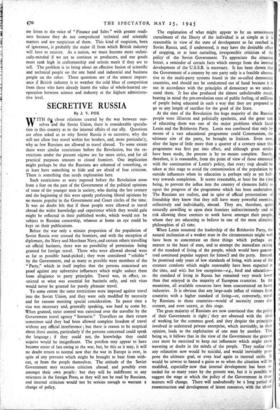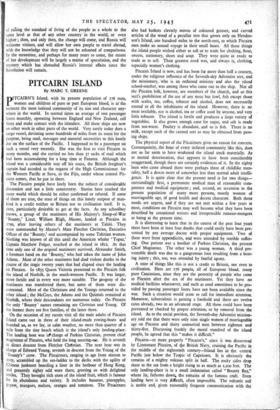SECRETIVE RUSSIA
By J. V. FOX
Such restrictions as were imposed before the Revolution arose from a fear on the part of the Government of the political opinions of some of the younger men in society, who during the last century and the beginning of this were openly professing liberal opinions by no means popular in the Government and Court circles of the time. It was no doubt felt that if these people were allowed to travel abroad the wider knowledge and experience which they would gain might be reflected in their published works, which would not be subject to Russian censorship, whereas at home an eye could be kept on their publications.
Before the war only a minute proportion of the population of Soviet Russia ever crossed the frontiers, and with the exception of diplomats, the Navy and Merchant Navy, and certain others travelling on official business, there was no possibility of permission being granted for foreign travel. Those who were allowed abroad were as far as possible hand-picked ; they were considered " reliable " by the Government, and as many as possible were members of the " Party," which in itself implies that the persons concerned are proof against any subversive influences which might seduce them from allegiance to party principles. Travel was, in .effect, re- stricted to what was essential for busin6s only, and exit visas would never be granted for purely pleasure travel.
To some extent the same restrictions were imposed against travel into the Soviet Union, and they were only modified by necessity and for reasons meriting special consideration. In peace time a visa was necessary and, generally speaking, was hard to come by. When granted, strict control was exercised over the traveller by the Government travel agency " Intourist." Travellers on their return sometimes said they had been allowed complete freedom of travel without any official interference ; but there is reason to be sceptical about these stories, particularly if the persons concerned could speak the language ; if they could not, the knowledge they could acquire would be insignificant. The posifion may appear to have become easier of late owing to the war, but, be this as it may, it will no doubt return to normal now that the war in Europe is over, in spite of any pressure which might be brought to bear from with- out, or from the people themselves. The attitude of the Soviet Government may occasion criticism abroad, and possibly even amongst their own people: but they will be indifferent to any strictures in the foreign Press, as they will not be read by Russians, and internal criticism would not be serious enough to warrant a change of policy.
The explanation of what might appear to be an unnecessary curtailment of the liberty of the individual is as simple as it is
reasonable in view of the state of development so far reached in Soviet Russia, and, if understood, it may have the desirable effect of stopping, or at least curtailing, irresponsible criticism of the policy of the Soviet Government. To appreciate the situation better, a reminder of certain facts which emerge from the internal development of the U.S.S.R. is necessary. It has been shown that the Government of a country by one party only is a feasible alterna-
tive to the multi-party systems found in the so-called democratic countries, and should not be condemned out of hand because it is not in accordance with the principles of democracy as we under- stand them. It has also produced the almost unbelievable result, bearing in mind the pre-revolution state of public feeling, of millions of people being educated in such a way that they are prepared to go to any length of sacrifice for the good of the State.
At the time of the Revolution the huge majority of the Russian people were illiterate and politically apathetic, and the great task of educating them was one of the major problems which faced Lenin and the Bolshevist Party. Lenin was convinced that only by means of a vast educational programme could Communism, the -ultimate aim of the party, be brought to fruition. Even now, after the lapse of little more than a quarter of a century since this programme was first put into effect, and although great strides have been made, the process is by no means complete. Surely, therefore, it is reasonable, from the point of view of those entrusted with the continuation of Lenin's policy, that every step should be taken at this stage to avoid the contamination of the population by outside influences when its education is perhaps only as yet half- way towards completion. It seems reasonable, at least for the time being, to prevent the influx into the country of elements liable to upset the progress of the programme which has been undertaken. The Russians are realists, and in spite of official protestations of friendship they know that they still have many powerful enemies, collectively and individually, abroad. They are, therefore, quite naturally unwilling to open their frontiers indiscriminately and to risk allowing these enemies to work havoc amongst their people. whom they are educating to believe in one of the most altruistic philosophies of all tithe.
When Lenin assumed the leadership of the Bolshevist Party, the natural inclination of a weaker man in the circumstances might well have been to concentrate on those things which perhaps are nearest to the heart of man, and to attempt the immediate raising of the standard of living of the people, which would have guaran- teed continued popular support for himself and the party. Instead. he promised only years of low standards of living, with none of the creature comforts which might reasonably have been expected at the time, and with but few exceptions—e.g., food and education— the standard of living in Russia has remained very much lower than that enjoyed in the majority of European countries. In the meantime, all available resources have been concentrated on heavy industries. It is obvious that any large-scale influx of visitors frcm countries with a higher standard of living—or, conversely, travel by Russians to those countries—would of necessity create dis- content, and even unrest, at this stage.
The great majority of Russians are now convinced that the policy of their Government is right ; they are obsessed with the ideal of working for the common good, and they despise the principles involved in unfettered private enterprise, which inevitably, in their opinion, leads to the exploitation of one man by another. This being so, it follows that in the view of the Government the greatest care must be exercised to keep out influences which might cause wavering or doubt in the minds, of the people. They realise that any relaxation now would be suicidal, and would inevitably post- pone the ultimate goal, or even lead again to internal strife. It would be unwise to hazard a guess as to when the situation will be modified, especially now that internal development has been re- tarded for so many years by the present war, but it is possible to suggest the stage at which the policy of the Government in these matters will change. There will undoubtedly be a long period of reconstruction and development of latent resources, with the oblec1 of raising the standard of living of the people as a whole to the same level as that of any other country in the world, or even higher ; then, and only then, the change will come, and Russia will welcome visitors, and will allow her own people to travel abroad, with the knowledge that they will not be ashamed of comparisons. In the meantime, and perhaps for many years to come, the extent of her development will be largely a matter of speculation, and the mystery which has shrouded Russia's internal affairs since the Revolution will remain.



























 Previous page
Previous page